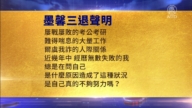【新唐人2012年8月13日訊】中國大陸的游泳運動員孫楊、葉詩文在倫敦奧運會上各得兩面金牌後,房地產開發商向他們贈送套房,杭州市要為他們樹立雕像。贊助商的大筆合同在等待著他們。中央和地方政府還將給金牌運動員頒發數十萬元的獎金。與此同時,媒體披露一些曾經風光的運動員退役之後,因為沒有謀生能力,生活貧困潦倒。這種強烈對比的背後,是甚麼因素造成的呢?請看本臺記者的報導:
16歲的葉詩文和21歲的孫楊在倫敦奧運雙雙打破游泳世界記錄,且各獲兩塊金牌後,一夜間成了風靡全國的明星人物,據了解,有不少開發商看準兩人的明星潛質,目前已有兩家杭州的房地產商,希望贈送給他們市價約300萬元人民幣的住宅。杭州市體育總局也延續傳統,將杭州體育館門前的「杭州奧運冠軍雕塑」的數量從四座增加到六座。而倫敦奧運女子200米蝶泳金牌獲得者焦劉洋,當選解放軍武警中共十八大代表。享受正團級待遇。
據《路透社》報導,中央政府給北京奧運會金牌獲得者35萬元獎金,比雅典奧運會增加15萬元。預計倫敦奧運會金牌獲得者的獎金還要增加。西安省六月宣佈將給予金牌獲得者60萬元獎金。
廣州畫家何國泉表示,中共當局把奧運金牌作為粉飾政權的手段是一種騙術。金牌的多少跟國家強大和民眾福祉沒有關係。
廣州畫家何國泉:「 你金牌多又怎麼樣呢?該失業的失業,該被邊緣的被邊緣,因為我也是反對奧運的,我在2001年做一些作品反對奧運,反對北京舉國之力,不管人民死活,花幾千億,到現在都不敢報,都不敢給老百姓一個交代。」
國家體育總局部門決算表顯示, 2011年度為近40億元,一個奧運週期就是160億。著名體育記者李承鵬認為,中央加上省市縣各級的體育局,估計一個奧運週期要花費500億。
美國《紐約時報》報導說,圍繞奧運會而建立的這種文化是精英體育。北京奧運會的遺產是為了龐大的作秀而不是改變草根階層。曾經訓練中國奧林匹克游泳運動員的英國教練這樣解釋中國人破記錄的表現:他們想要的“不是所有人的體育,而是金牌”。雖然他們在倫敦創造了歷史,許多普通中國人仍然不會游泳。
何國泉:「 事實上在中國老百姓裡面,很多項目連見都沒見過。比如說,我將近50歲的人,擊劍我都沒有摸過。包括那些十米跳臺,我也沒有見過。很多電視裡的綠蔭場所,我都沒有見過。」
與金牌運動員名利雙收形成對比的是,另外一些運動員退役後,生活貧困潦倒。前國際馬拉松冠軍艾冬梅,因訓練導致雙腳殘疾。退役後,艾冬梅一家的月收入只有1300元,為謀生,她一度擺起地攤。黃成義曾經和姚明在全國籃球訓練營較量。因受傷退役,由白髮蒼蒼的母親帶到北京治病。他一度蝸居在北京南站旁邊的一個即將拆遷的工房裡,在床板上咀嚼著靠母親拾荒換來的大餅。
《長城抗戰網》總編賈元良認為,這種強烈的對比要歸咎於奪取金牌的舉國體制。
《長城抗戰網》總編賈元良:「 因為舉國體制的缺陷,首先在於把更多的權利金錢投資到極個別人身上,沒有投資到普通大眾身上。第二,這種體制對運動員的後續保障,對其他運動員也是不太公平的。第三,這種方法也造成了很多急功近利的矛盾,大家只是奔著金牌,而且不注重運動員的教育水平、物質、文化,方方面面的提高。」
據《德國之聲》報導,德國奧運代表隊目前共有392位效力的運動員。這些運動員在德國奧委會要登記個人資料。其中在「職業」這一欄,只有不到40人填寫了「職業運動員」。 90%的運動員是普通職業者,包括木工,建築設計師,消防員等等。
採訪編輯/秦雪 後製/葛雷
Sharp Contrast In China: Comparing New and Retired Olympic Gold Medal Winners.
Chinese swimmers Sun Yang and Ye Shiwen have gained
fame and fortune after winning golds in the London Olympics.
They are reported to be receiving houses
as gifts by real estate developers.
There are to be statues erected of them
by the Chinese Communist Party (CCP).
They have secured large-scale contracts with sponsors,
and given several hundred thousand yuan from CCP central and local authorities.
In contrast, many retired, former renowned athletes
are living in poverty, with no income after the sport.
What has caused such a sharp contrast in these realities?
During the 2012 London Olympics Games,
Ye Shiwen, aged 16, and
Sun Yang, aged 21, broke World records
in swimming, with each winning two gold medals.
The two became famous overnight.
Two Hangzhou-based property developers want
to present them each with a 3 Million Yuan house.
Hangzhou Sports General Administration intends
to set up statues of the two champions’ in the city.
Women’s 200 meters butterfly gold medal winner
Jiao Liuyang was selected as an army delegate to the CCP’s 18th Congress.
Jiao receives benefits the same as that of a regiment
commander-level military officer.
Reuters reported that the CCP regime “paid
their athletes a 350,000 yuan ($54,900) bonus for winning gold at the Beijing Games.”
That was an increase of 150,000 yuan
in comparison to Athens in 2004.
The prize “is expected to trump that
for those who top the podium in London.”
This June, CCP authorities in Shan’xi Province
authorities claimed to award 600,000 yuan to their athletes’ for every gold metal in London.
Guangzhou-based painter He Guoquan says the CCP
regime uses the Olympic gold medals to prettify its rule.
The number of gold medals has no direct links with
a nation’s mightiness and the people’s welfare.
He Guoquan: “So what will it be even
if you can win so many gold medals?
People are still unemployed, and still marginalized.
In 2001 in my works, I resisted the Beijing Olympic
Games that cost hundreds of billions yuan.
This was at the expense of people’s livelihood.
Until today, on this aspect, no official
explanation has been given to the public."
The Sports General Administration’s financial statement
showed that 2011 expenditure reached nearly 4 billion yuan.
The figure is 16 billion yuan for the entire Olympic period.
Li Chengpeng, a famous sports reporter, remarked that
the expenditure of the regime’s Sports Bureau at all levels
is estimated around 50 billion yuan.
The New York Times quoted Paul French,
a British author of books about Chinese society.
“The culture created around the Olympics
is that sports is something for the elite.”
The article stated that “the legacy of the Beijing Olympics
has been to promote grand performances rather than that of grassroots changes.”
A British coach who trained China’s Olympic swimmers
once commented on their record-breaking performances.
“They have wanted ‘not sport for all, but gold medals.
While they have made history in London,
many ordinary people in China still cannot swim.”
He Guoquan: “The Chinese ordinary people have
never seen the Olympic games in their daily lives.
For example, I’m nearly 50 but have never practiced fencing,
nor did I ever get close to the 10-meter diving tower.
Even those scenes of green shown on TV,
I’ve never seen them in reality.”
In contrast to the gold medalists who gain fame and wealth,
many retired Chinese athletes lived impoverished lives.
Ai Dongmei, former winner of the Beijing International
Marathon, disabled her feet during training.
The monthly family income for
Ai Dongmei is only 1,300 Yuan.
She even set up a roadside stall to earn a living.
Huang Chengyi was Yao Ming’s peer during
training at the national basketball training camp.
Huang retired due to injury, and went
with his mother to Beijing for treatment.
He once dwelled in a demolishing work
shed nearby Beijing South Railway Station.
He traded his mothers waste collection
for a meal of pancakes.
Jia Yuanliang, chief editor of Cckz1933.cn, highlights the
sharp contrast the gold-medal focused state sports system.
Jia Yuanliang: “This is due to the problem
with the state sports system.
Firstly, it focused its investment on very few athletes,
rather than putting them onto the general public.
Secondly, the system doesn’t offer
a fair future financial security to all athletes.
Thirdly, it created a lot of contradictions
in seeking short-term benefits.
More emphasis was placed on winning gold metals than
on the comprehensive improvement of quality of athletes."
Deutsche Welle reported that the German
Olympic team consists of 392 athletes.
Less than 40 of them are “professional athletes”.
This is according to their personal registration data
for the German Olympic Committee.
90% of German Olympic athletes
are registered as ordinary professionals.
This spans professions including
carpenters, architects and firefighters.





























